- Home
- J. Clifton Slater
Uncertain Honor Page 12
Uncertain Honor Read online
Page 12
Alerio pulled out the Night Bees and drew his new Noric steel gladius. With a chop, he broke the blade of the first Nocte Apibus then the other. From his belt he pulled a piece of parchment and placed it on one of the coffins. Using the pieces of the assassin’s knives, he anchored down the edges.
After leaping onto the driver’s bench, Alerio Sisera drove the mules and empty cart from the yard with a snap of a whip.
“He should be killed for the disrespect,” the boy suggested.
“Sisera is a very dangerous man,” Milon pointed out. “He has proven it many times. Revenge, little watcher, is a waste of your skills. Remember that.”
Muffled noises came from inside both boxes. Milon walked to the coffins and leaned forward. Before opening the lids, he read the message anchored down by the broken daggers.
The honey from your valley is delicious.
Your discipline leaves a lot to be desired.
Alerio Sisera, Ally of the Golden Valley
Act 5
Chapter 13 – Grain for Hungry Mouths
The five miles of beach, plus any piece of land not occupied by a warship, had blankets and tents covering the ground. From shoreline to far inland, oarsmen, sailors, and Legionaries rested after the trip from Ostia. They all understood Pozzallo was but one stop on the long journey to the Qart Hadasht homeland. What they didn’t understand was the lack of food.
“We can’t go back and we can’t go much farther,” Lucius Longus grumbled. “Where is your Senior Tribune Sisera? Where is our coin? Where is our grain?”
For the last four days, Consul Regulus had endured the complaints. His Co-Consul harped on Alerio’s missing quinquereme and the absence of grain at this one and the last two ports-of-call. One hundred and forty thousand men mowed through the fleet’s grain capacity as if they were a swarm of locusts.
The consumption rate Marcus Regulus knew too well. As to the whereabouts of Sisera or Centurion Kimo and the Psyche of Bellona, Marcus had no idea. Alerio’s letter stated the Senior Tribune was going to seek grain elsewhere. Other than a warning about the presence of a Qart Hadasht fleet, the missive gave him no answers.
“I guess tomorrow we start butchering the livestock,” Regulus offered.
“And when we reach the Punic shore, what do we eat then?” Longus snapped. “Each other?”
The two chief Magistrates of the Roman Republic glared across the tent. Before harsher words were exchanged, Regulus left the pavilion, located a cleared path between campsites, and strolled to a spot near the water. As he walked, six Legionnaires from First Century moved with him.
Marcus watched birds fly over the swells and enjoyed the afternoon sunlight reflecting off the water. He missed his wife and children and being a Senator. After the last time he was a Consul, Regulus swore he wouldn’t indulge in the politics of higher office. He should be home. Not on the sands of Pozzallo worried about feeding a fleet. But no other Senator knew or understood the capability of the Navy as well as a Fleet Proconsul. Thus, it fell to Marcus Regulus to replace Consul Quintus Caedicius when he died.
“Ships sighted,” a lookout cried. “Launch the standby warships.”
From different areas of the beach, fast-attack three-bankers raced into the surf and rowed westward. Marcus hunched his shoulders and squinted into the low sun, trying see the arriving vessels. If they were Qart Hadasht ships-of-war, he could lose half his fleet before his warships got off the beach. But then, the triremes slowed and three circled back towards their berths.
The tenson eased from Consul Regulus’ shoulders as three transports rowed close enough to be identifiable. They were being shepherded by one of his quinqueremes.
“Good job Sisera,” he uttered after identifying the Bellona rowing behind the merchantmen. “At least you didn’t sink with our grain funds.”
Before he had the opportunity to head up the beach, an inland sentry shouted, “Wagons coming. Alert Century, front and center.”
Marcus Regulus noted the lack of free boards on the new transports. They were full of heavy cargo, hopefully grain. And while he wanted to speak with Alerio Sisera, the mysterious wagons deserved an inspection.
“I need to see those wagons,” he informed the squad leader from the First Century.
“Right away, General,” the veteran Decanus replied. Addressing the guard detail, the squad leader directed. “Form a wedge, the Consul is heading North.”
Before General Regulus had taken one step, three Legionaries formed an arrowhead and began clearing a path for him. The other three boxed him in for protection as the entourage cut a swath through the campsites.
***
In the evening, ship’s Centurion Kimo stood in the Consuls’ pavilion facing the two Generals. Positioned in a cleared corner as if the night’s entertainment, he had room to move as did the two Consuls. Not so the cramped staff officers of the fleet, and the Tribunes and Senior Centurions of four Legions. They stood shoulder to shoulder pressed into close ranks.
“Senior Tribune Sisera sent me ahead to track the Punic grain ships. I missed them at Pozzallo. But caught up with them as they were loading grain at Manfria,” Kimo explained. He took a drink from a glass goblet and continued. “The last time I saw Sisera, he was going to seek an alternative source for grain.”
“It seems he was successful based on the wagons of wheat, barley, and spelt,” Regulus offered. “As were you, Centurion Kimo. Capturing three enemy grain ships and the Punic’s purse deserves a commendation. You and your crew will receive a Consul’s citation and extra pay.”
“Thank you, sir,” Kimo acknowledged.
“Kimo, you are dismissed,” Consul Longus instructed. He looked around the pavilion and ordered. “Everyone out. Go prepare your men, we launch at dawn.”
As Kimo left the tent he allowed a smile to grace his face. Not only didn’t ship’s Centurions get to visit the Consuls’ pavilion and drink their vino from fancy glassware, never were they the night’s entertainment. He rushed into the dark, heading for his warship to inform his officers and the crew of the bonuses and the praise.
***
Long before dawn, the drone of insects attracted by the torches caused the sentry to snooze standing up. He snapped awake when hoofs and the creaking of a cart interrupted the night sounds.
“Who is there?” he demanded.
Two mules materialized from the blackness.
“If I were a bandit,” the driver of the mule cart chastised, “you would be on the ground unconscious and bleeding to death. A horrible way to greet the Goddess Nenia, and a terrible end for a young life. Stay awake.”
The tone and attitude of the driver reminded the infantryman of his Centurion. He braced in response.
Without stopping, the driver snapped the reins and the mule cart rolled by the sentry’s post. It wasn’t until the unknown man had vanished in the night that the Legionary realized he never received an answer to his challenge.
***
The embers of campfires glowed along the beach as far as the eyes could see. Numbering over fourteen hundred, the hot spots marked camps near their ships for groups of oarsmen, Marines, and Legionaries. Unfortunately for Alerio and Hector, they had no idea where to find the Psyche of Bellona. And locating the warship in the morning along five miles of beach when men were packing, and boarding was not optimal.
However, in every Legion encampment, the First Century was guaranteed to know the location of every Century and support unit. They were obliged to know. If the Consul wanted the information, he asked the First. Alerio aimed the mules for the ring of torches around the big tent and the alert sentries.
“First Century,” Alerio called out when he neared the Consuls’ pavilion. “Does anyone know where the Bellona is beached?”
“Is that Centurion Kimo’s ship?” a Legionary asked.
“That’s right,” Alerio responded.
“Three miles down the beach,” the sentry told him. “You can’t miss the warship. The crew is ha
ving a party.”
Alerio nodded his understanding while urging the mules forward. A celebration meant success. If Kimo found the Punic grain buyer and his transports, he and the crew deserved to celebrate.
The bonfire blazed with flames reaching high into the sky. Unlike the embers and sleeping figures at other camps, the Bellona camp rang with loud talking and singing.
“Senior Tribune,” Kimo declared when Alerio arrived. Having to leave the mule cart inland due to the crowded coastline, Alerio supported the injured Hektor into camp. “Welcome back. Will someone help Hektor? Here, sir, have a drink.”
The boy was taken to a blanket where he was propped up. Alerio received a wineskin.
“Centurion Kimo, I assume you were successful?” he inquired.
“Yes, sir,” Kimo replied. “Combined with your wagons, we have grain aplenty. Let me tell you about it…”
The ship’s Centurion told him and Alerio happily listened. Because if Kimo talked, he wasn’t asking Alerio how he managed to secure a caravan of grain wagons.
***
Launching almost six hundred seagoing vessels, managing them while on route, and beaching the warships and anchoring the transports at night was a logistical nightmare. By comparison, a Legion in the field might have a Century wander a mile off the march. Once found by a search party, they were brought back into the compound by nightfall. With a fleet of vessels stretching over the horizon, lost ships might be gone for days before reacquiring the fleet.
To maintain control of large groups, the Navy formed squadrons of ten warships. Minding their flock, squadron commanders coordinated the movements of the individual vessels with the flagships. Even so, the movement of thirty-three squadrons did not solve the problem of mass movement. As a result, the expedition was divided into three parts.
Consul/General Longus and his flagship had the forward element. With extra Legionaries on his one hundred quinqueremes, he provided the first line of defense. Plus, for early warning, Longus sent twenty triremes ranging far ahead of the fleet.
In the middle of the armada, Consul/General Regulus from his flagship managed the quinqueremes with the corvus boarding ramps. Ninety-six warships hauled the heavy ramps. While devastating in action against enemy ships, they were the least maneuverable. Giving the fleet’s center mobility was another fifty quinqueremes patrolling around the corvus ships.
Finally, in the rear, fifty-four quinqueremes and ten triremes formed a box around the two hundred and sixty merchantmen. Every one of the troop and livestock transports, grain haulers, and supply vessels was necessary. They were the key to the successful invasion of the Punic coast. And most were needed to feed the fleet during transit.
From Longus’ flagship with its sections of 6-banked oars, to the last quinquereme with 5-banked oars, the fleet covered nine miles. Not counted in the length were the fast-attack triremes, with the 3-banked oars, patrolling out front.
***
In late afternoon, the far-ranging 3-bankers reached Manfria on the southwest coast of Sicily. Half the squadron beached, and their crews went ashore checking to be sure the area was clear of Qart Hadasht mercenaries. The other five triremes remained at sea. They watched the horizon for enemy ships-of-war and signaled the location of the beach to arriving warships.
Once Longus’ forward element began to land, he signaled for half a squadron of 5-bankers to replace the triremes. Later, Regulus would move a half squadron from his center to do the duty. When the rear element arrived, a commander positioned a half squadron of quinqueremes to replace Regulus’ 5-bankers. Until the warships were beached, and the transports anchored, they were screened by a floating ready force. As the sun lowered and no more ships were traveling, the 5-bankers landed. For the remainder of the day, a half squadron of triremes were crewed, meaning the five attack crafts were prepared to launch and engage if an enemy ship-of-war appeared.
***
But Manfria proved peaceful. No soldiers waited in the trees, and no ships-of-war appeared on the horizon. After fourteen days in route, the fleet of the Republic settled in around their campfires. They had an abundance of grain and were only one port-of-call away from leaving Sicilia and heading towards the Punic coast.
“It’s going to be a pleasant evening,” Longus observed. He stretched his back and declared. “This adventure has been almost mundane.
His Co-Consul inhaled, tamped down his temper, and looked at the younger man.
“There is a Qart Hadasht fleet out there,” Regulus commented. “We don’t know where they’ll intercept us or how many ships they’ll bring.”
“So says your Senior Tribune Sisera,” Longus scoffed. “But I’m not convinced the Empire knows about our plan. And if they do, they haven’t had time to gather a fleet.”
On the Senate floor, Regulus would deliver an eloquent rebuttal. But on the beach at Manfria and surrounded by men depending on their Consuls, he simply walked away.
***
Out on the water, a fishing boat cast nets and drifted with the tide. Oddly enough, it finished fishing when the boat came parallel to the last warship. Then, the six fishermen turned the boat and rowed back in the direction of the town of Licata. The village rested on a blunt point of land eleven miles up the coast. The surrounding shoreline was known to the locals as Cape Ecnomus.
When the fishing boat reached its home port, two men leaped from the vessel, mounted horses, and raced northward out of Licata. Shortly after dark, they left the trail, walked to the shore, and boarded an Empire ship-of-war.
***
In the middle of the night, General Hamilcar was awakened by his chief of staff.
“Sir, coast watchers from Cape Ecnomus,” the staff officer advised.
Hamilcar rolled out of bed, dressed in his armor, and went to meet the watchers.
“Sir, we counted three hundred and thirty warships,” one reported. “This very night, they are beached at Manfria.”
“And they have two hundred and sixty merchant ships with them,” the other added. “There’s no doubt, General, there is an invasion fleet. I fear for your homeland.”
“I swear, Cape Ecnomus is as far as they will go,” Hamilcar exclaimed. To his commanders, he instructed. “Gather the fleet.”
Before the moon had started down the backside of the sky, the rowers, and soldiers of the Qart Hadasht fleet were being shaken awake and told to gather around.
“The Republic Legionaries are coming to enslave you,” General Hamilcar warned from a platform. His words were passed onto the hired mercenaries and the soldiers and warriors sent as tributes from nations around the Qart Hadasht Empire. “If we stop them here, the fighting will be confined to Sicily. If not, they will attack your native lands and destroy everything you hold dear.”
The men of his fleet roared with enthusiasm. Feeling the emotion was right, even if the dark presented hazards, Hamilcar ended with an order, “Soldiers and sailors of the Qart Hadasht Empire, man your ships-of-war.”
Chapter 14 –Bronze Rams at Dawn
The fires were cold and the men stiff, it was a typical start for a day in the fleet.
“Give me a squadron of three-bankers to guard the launch,” a Navy Tribune shouted.
In response, ten triremes slid from the sand and stroked away from land. Five of them held offshore and began circling as close support if an enemy approached from seaward. The other half rowed northward.
The five acting as scouts reached Licata and rounded Cape Ecnomus. With no sightings of ships-of-war, the triremes slowed the stroke rate and set sails for the day’s cruising.
Consul Longus’ forward element launched. The big five-bankers rowed out and swung northward. The ones farther down the beach had to power stroke around until the quinqueremes formed a line. Each feathered their oars holding position in the swells waiting for the Consul’s septireme to launch. Until he took his place in the center of the line, the forward element and the remainder of the fleet were delayed in getting underway.
>
***
Marcus Regulus watched from his flagship as the forward group waited for Longus to leave the beach. It was as if his Co-Consul relished the chance to parade in front of the men. Regulus had news for Longus. His rowers couldn’t see the flagship and none of the sailors cared. But his command staff and the Tribunes on the waiting quinqueremes of the center group noticed the antics.
When Longus finally rowed off the beach his Co-Consul issued the orders for his center element to launch.
“Once their line moves, launch our light five-bankers,” Regulus instructed the signalmen. To his flagship’s Centurion, he ordered. “Get me off this beach.”
“Yes, sir,” the septireme’s officer acknowledged. “First Principale, get us wet.”
The order reached the beach, and half the oarsmen of the huge ship pushed the hull. On the rowing decks, the ship’s other one hundred and ninety oarsmen prepared to dip their oars.
“Consul Regulus doesn’t like lounging on the beach,” a sailor noted.
“Right, you are,” another agreed. “Unlike the other Consul, this one doesn’t want a parade.”
From the steering deck of Regulus’ ship, flags waved and fifty unhampered five-bankers launched. A squadron raced out to the deep water and relieved the triremes. While the three-bankers raced north to join their squadron, the quinqueremes with the Corvus boarding ramps shoved off and floated free of land.
Eventually, all the elements of the fleet’s center were afloat and moving.
***
“Stand by to cut the merchantmen free,” Navy Tribune Seichus announced from the Arms of Salus.
Named for the Goddess of Deliverance, the quinquereme served as the flagship for the end of the fleet. Signalmen waved separate flags from her steering platform.
Along the beach, the rear element of the fleet untied from the supply vessels and the troop transports. After pulling in ramps, the sailors used poles to push the vessels away. Drastically under powered, the civilian rowers walked their oars building momentum and moving the ships away from the shoreline. Waiting on the beach were fifty-four quinqueremes and twenty triremes. The mixture of five-bankers and three-bankers provided might and speed to the rear element.

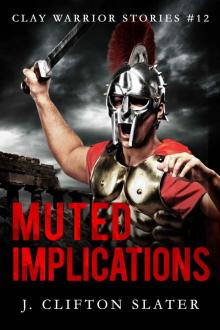 Muted Implications (Clay Warrior Stories Book 12)
Muted Implications (Clay Warrior Stories Book 12)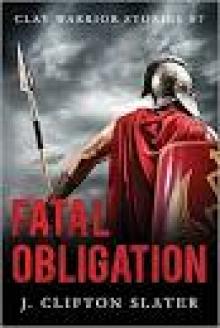 Fatal Obligation
Fatal Obligation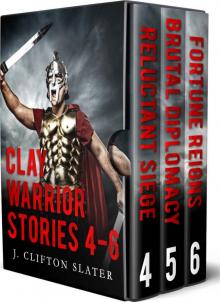 Clay Warrior Stories Boxset 2
Clay Warrior Stories Boxset 2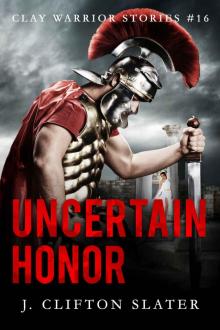 Uncertain Honor
Uncertain Honor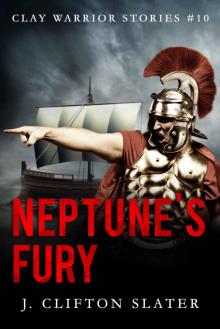 Neptune's Fury
Neptune's Fury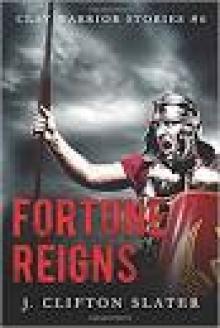 Fortune Reigns
Fortune Reigns Op File Treason
Op File Treason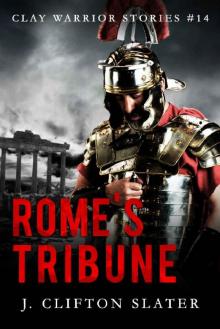 Rome's Tribune (Clay Warrior Stories Book 14)
Rome's Tribune (Clay Warrior Stories Book 14) Clay Warrior Stories Boxset 1
Clay Warrior Stories Boxset 1 Serpent Circles
Serpent Circles Reluctant Siege
Reluctant Siege Infinite Courage
Infinite Courage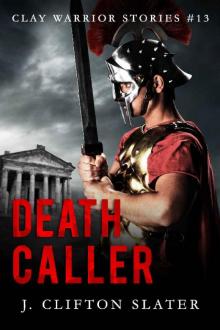 Death Caller (Clay Warrior Stories Book 13)
Death Caller (Clay Warrior Stories Book 13) Op File Sanction
Op File Sanction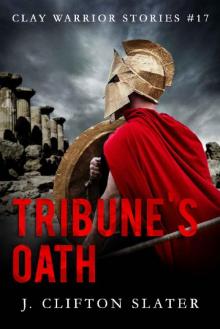 Tribune's Oath (Clay Warrior Stories Book 17)
Tribune's Oath (Clay Warrior Stories Book 17) Galactic Council Realm 1: On Station
Galactic Council Realm 1: On Station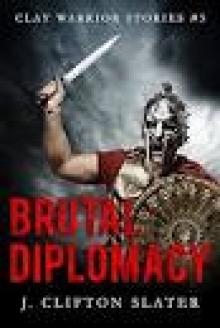 Brutal Diplomacy
Brutal Diplomacy Op File Revenge
Op File Revenge On Point
On Point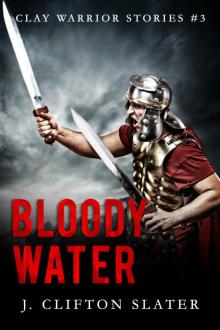 Bloody Water (Clay Warrior Stories Book 3)
Bloody Water (Clay Warrior Stories Book 3)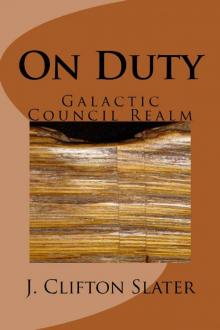 Galactic Council Realm 2: On Duty
Galactic Council Realm 2: On Duty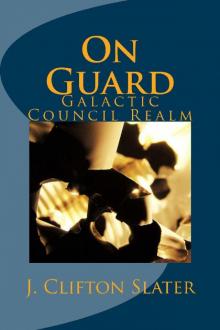 Galactic Council Realm 3: On Guard
Galactic Council Realm 3: On Guard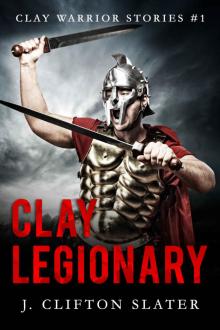 Clay Legionary (Clay Warrior Stories Book 1)
Clay Legionary (Clay Warrior Stories Book 1) On Point (Galactic Council Realm Book 4)
On Point (Galactic Council Realm Book 4) Op File Revenge (Call Sign Warlock Book 1)
Op File Revenge (Call Sign Warlock Book 1)